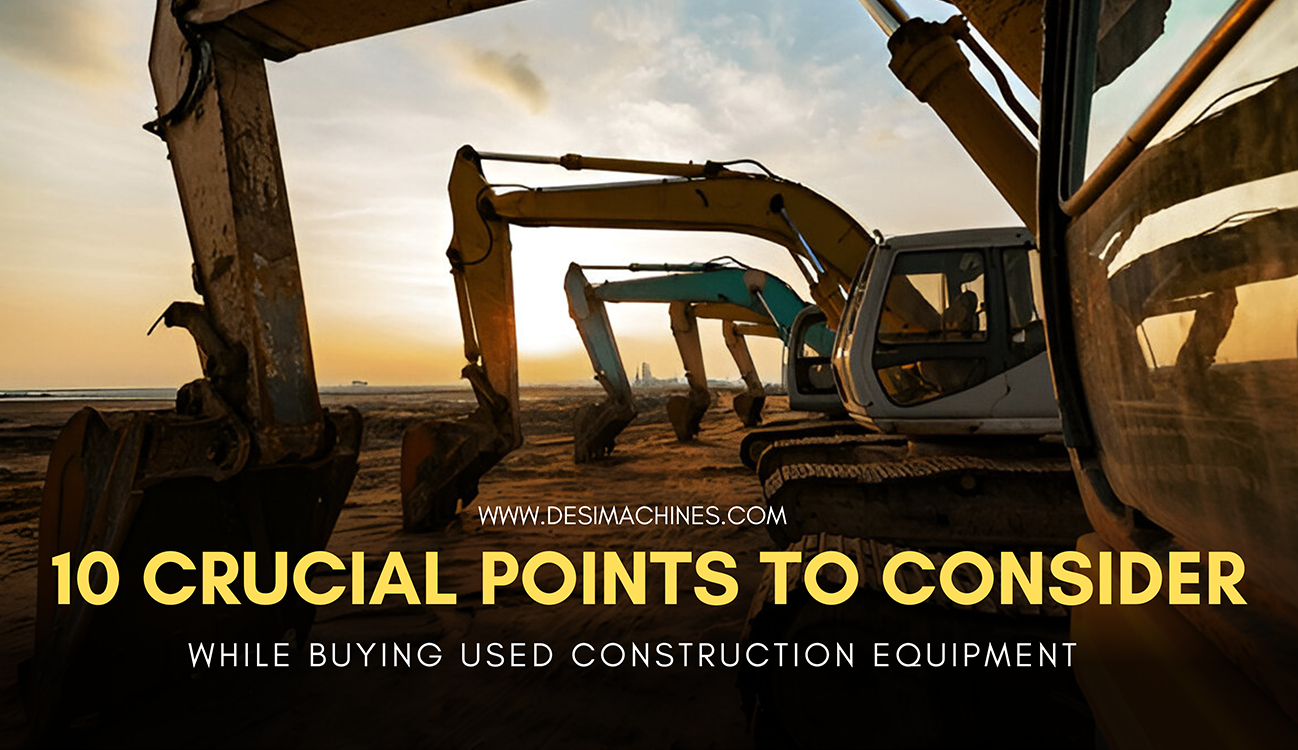
By NIsha Mondal
Jan 29, 2025
( 0 )
The construction and mining industries are experiencing a rapid boom. With this growth, the demand for heavy machines is also rising. The companies associated with these industries are looking for cost-effective and reliable machinery as these machines are costly. The alternatives are using second-hand or used machinery which are available in the market for relatively low cost. New machines are very costly and not always feasible for small and medium-scale companies. Moreover, sometimes the scope of work doesn’t financially match the idea of buying a new one. So financially evaluating the need is always necessary. Here are a few tips you can keep in mind while buying a second-hand or used machine.
The first point to consider while buying second-hand or used machine is the scope of work. The need for the machine is to be identified first. If the work scope includes earthmoving operations then you should go for machines like excavators, bulldozers, or motor graders. Whereas when the work is loading, unloading, or material handling then forklifts, telehandlers, cranes, or wheel loaders are appropriate. So, identifying the job is as important as selecting the machine to buy or rent according to job type.
The age and operating hours are important factors to see when buying a used machine. Most of the machines like cranes, skid steer loaders, and dump tippers are often measured in hours of operation. The more the operating hours more it is prone to wear and tear. So, it is important to see the log book and meter reading before buying a used machine. Machines that have been used for a long and have been in frequent use must be avoided.
The machine should be thoroughly checked before buying. Important parts such as engines, undercarriages, hydraulics, and tires should be checked for damage and longevity. Overall inspection should be done to check for rust, damage, or cracks. If the damage is high and the repair cost is higher, the machines should be avoided from buying. For example, for an excavator, the bucket, arm, and boom need to be checked. In hydraulic excavators, the hydraulic hoses must be checked to avoid costly repairs later.
These types of machines require regular maintenance. The owner should maintain these machines at regular intervals. When buying a second-hand machine look for maintenance records to get an idea of the maintenance. Regular maintenance includes oil changes, cleaning of undercarriages, and maintenance of hydraulics. These will keep the machine in good condition for a long time. Machines with bad service records will face frequent breakdowns and vice versa.
Unlike other vehicles, these machines also require documents. So, when buying a second-hand machine, one must look at the documents carefully. Documents include registration certificate, insurance, pollution under control certificate, and road tax receipt. In the case of very large machinery like cranes and long-reach excavators, custom clearance is required to ensure legality. Documents is important to prevent future legal problems.
When you buy construction equipment, test the machine thoroughly and by an expert. Test run the machine under real conditions and its attachments to check its performance and reliability. Each machine has a different operation and specific purpose. Here’s what to check for each machine:
Some of the brands have the issue of unavailability of spare parts in certain parts of India. So, it is better to look out for the availability of spare parts. Some of the used machines often become outdated and spare parts cannot be found in the market. Some machines like Bulldozers and motor graders require specialized parts, so ensuring parts availability is a must.
Whenever you are looking for sellers or dealers of second-hand equipment always choose the reputed one. Often reputed dealers provide refurbished products with warranties.
Prices vary for different reasons like the age of the machine, brand, and conditions. The market survey should made for prices of similar products and then check who offers a better deal.
Nowadays every company is making sustainable machines with fuel efficiency. It should be checked whether the machine is environment friendly or not. The machine should be checked that it is equipped with features like ROPS (Roll Over Protection System) and FOPS (Falling Object Protection System).
In India buying a used machine is a good and cost-effective decision. But careful checking and inspection is necessary before buying these expensive machines. If you follow the above points then the chances of a wrong product reduce. Keeping in mind quality, reliability, and compliance with safety standards to ensure uninterrupted operations and long-term productivity.
Top 5 Backhoe Loader Brands in India – Popular Models & Their Price
Apr 17,2025
© 2025 Desi Machines All rights reserved.
Designed & Developed by PromotEdge
Desi Machines is a platform where you can see and compare construction equipment. It showcases images, brochures, features, technical specifications, brand details & dealer information. All these are taken from respective brand websites, brochures, and other public resources. We do not claim ownership of these materials and strive to ensure their accuracy. However, the disparity may happen and we advise users to verify directly with respective brands and dealers. Desi Machines is not liable for any inaccuracies or reliance on the information provided. Use of this website is at your own discretion.